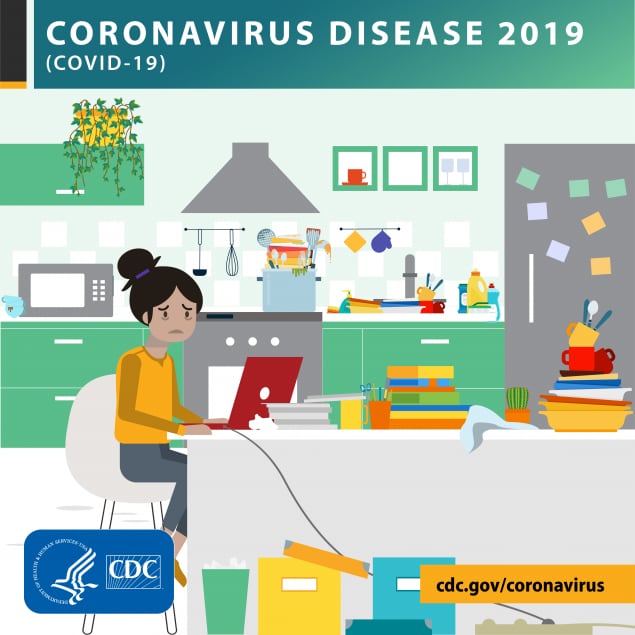Employees: How to Cope with Job Stress and Build Resilience During the COVID-19 Pandemic
Updated May 5, 2020
Whether you are going into work or working from home, the COVID-19 pandemic has probably changed the way you work. Fear and anxiety about this new disease and other strong emotions can be overwhelming, and workplace stress can lead to burnoutexternal icon. How you cope with these emotions and stress can affect your well-being, the well-being of the people you care about, your workplace, and your community. During this pandemic, it is critical that you recognize what stress looks like, take steps to build your resilience and manage job stress, and know where to go if you need help. Recognize the symptoms of stress you may be experiencing.
- Feeling irritation, anger, or in denial
- Feeling uncertain, nervous, or anxious
- Lacking motivation
- Feeling tired, overwhelmed, or burned out
- Feeling sad or depressed
- Having trouble sleeping
- Having trouble concentrating
Know the common work-related factors that can add to stress during a pandemic:
- Concern about the risk of being exposed to the virus at work
- Taking care of personal and family needs while working
- Managing a different workload
- Lack of access to the tools and equipment needed to perform your job
- Feelings that you are not contributing enough to work or guilt about not being on the frontline
- Uncertainty about the future of your workplace and/or employment
- Learning new communication tools and dealing with technical difficulties
- Adapting to a different workspace and/or work schedule
Follow these tips to build resilience and manage job stress.
- Communicate with your coworkers, supervisors, and employees about job stress while maintaining social distancing (at least 6 feet).
- Identify things that cause stress and work together to identify solutions.
- Talk openly with employers, employees, and unions about how the pandemic is affecting work. Expectations should be communicated clearly by everyone.
- Ask about how to access mental health resources in your workplace.
- Identify those things which you do not have control over and do the best you can with the resources available to you.
- Increase your sense of control by developing a consistent daily routine when possible — ideally one that is similar to your schedule before the pandemic.
- Keep a regular sleep scheduleexternal icon.
- Take breaks from work to stretch, exercise, or check in with your supportive colleagues, coworkers, family, and friends.
- Spend time outdoors, either being physically active or relaxing.
- If you work from home, set a regular time to end your work for the day, if possible.
- Practice mindfulness techniquesexternal icon.
- Do things you enjoy during non-work hours.
- Know the facts about COVID-19. Be informed about how to protect yourself and others. Understanding the risk and sharing accurate information with people you care about can reduce stress and help you make a connection with others.
- Remind yourself that each of us has a crucial role in fighting this pandemic.
- Remind yourself that everyone is in an unusual situation with limited resources.
- Take breaks from watching, reading, or listening to news stories, including social media. Hearing about the pandemic repeatedly can be upsetting and mentally exhausting
- Connect with others. Talk with people you trust about your concerns, how you are feeling, or how the COVID-19 pandemic is affecting you.
- Connect with others through phone calls, email, text messages, mailing letters or cards, video chat, and social media.
- Check on others. Helping others improves your sense of control, belonging, and self-esteem. Look for safe ways to offer social support to others, especially if they are showing signs of stress, such as depression and anxiety.
- If you feel you may be misusing alcohol or other drugs (including prescription drugs) as a means of coping, reach out for help.
- If you are being treated for a mental health condition, continue with your treatment and be aware of any new or worsening symptoms.
Know where to go if you need help or more information.
If you feel you or someone in your household may harm themselves or someone else:
- National Suicide Prevention Lifelineexternal icon
- Toll-free number 1-800-273-TALK (1-800-273-8255)
- The Online Lifeline Crisis Chatexternal icon is free and confidential. You’ll be connected to a skilled, trained counselor in your area.
- National Domestic Violence Hotlineexternal icon
- Call 1-800-799-7233 and TTY 1-800-787-3224
If you are feeling overwhelmed with emotions like sadness, depression, or anxiety:
- Disaster Distress Helplineexternal icon
- Call 1-800-985-5990 or text TalkWithUs to 66746
- Check with your employer for information about possible employee assistance program resources.
If you need to find treatment or mental health providers in your area:
Mental Health Resources
- CDC Coronavirus (COVID-19) Stress and Coping
- American Psychological Associationexternal icon
- National Alliance on Mental Illnessexternal icon
COVID-19 Resources
- NIOSH Workplace Safety and Health Topic
- CDC COVID-19
- CDCINFO: 1-800-CDC-INFO (1-800-232-4636) | TTY: 1-888-232-6348 | Website: cdc.gov/info

Leave a Reply